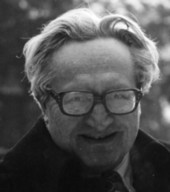
|
Outlook on life » Religia Muzyki i kult kompozytorów [4] „Od dawien dawna — pisał Kierkegaard — fanatyzm religijny z podejrzliwą uwagą obserwował muzykę" [ 30 ]. Wiadomo, że już św. Augustyn zdawał sobie sprawę z tego, że kult muzyki może zagrażać kultowi religijnemu, odrywając umysł od Boga i koncentrując go na przeżywaniu muzyki [ 31 ]. Kto żyje w świecie muzyki i myśli wyłącznie o niej, temu nie potrzebna jest żadna inna religia. Zdawało sobie z tego sprawę otoczenie Chopina. George Sand pisała o nim, że „dusza jego napełniona jest wyłącznie poezją i muzyką"; a ksiądz Aleksander Jełowicki, który przez wiele miesięcy czynił starania o to, żeby Chopin umarł po chrześcijańsku, napisał po jego śmierci, że Chopin „niestety, o Niebie nie myślał" [ 32 ]. Będąc w swojej istocie „kultem świeckim" Religia Muzyki może być integralnym składnikiem kultury świeckiej, wypełniającym pozytywnymi treściami aksjologicznymi potrzeby serc i zwiększającym jej atrakcyjność. * Andrzej Nowicki: THE RELIGION OF MUSIC AND THE CULT OF COMPOSERS Contrary to the opinion postulating that music should be subordinate to religion, the foundation of the Religion of Music is the view that music is the supreme value and as Buch should be the object of cult. The author distinguishes 10 forms of the cult of composers, and within these the positive and negative aspects are indicated. The negative aspects of the Religion of Music are connected first of all with a monocentric axiology which collides with the value of variety conditioning the aboundance of culture. Music does not need to be considered as the highest value. Nor is there a necessity to place the work of a given composer at the top of a hierarchie pyramid of compositions. As far as masterpieces are concerned they are all situated equally high; and controversies about which of them are higher are futile. Being in its essence a secular cult, the Religion of Music can form an element of secular culture, under the condition of accepting a polycentric axiology which appreciates music and other domains of culture equally well, and also under the condition of connecting the cult of given composers wich an attitude open to variety and extraordinariness of what is being created at present and what will be created in the future. The Religion of Music may be a form of escapism from the world and a resignation of its transformation, but the very participation in the process of building „the world of music" to some extent changes the world we live in, revealing „the realized Utopia" — a model of a different way of living and different relationships between the people. * „Euhemer — Przegląd Religioznawczy", 1985, nr 3(137)
Footnotes: [ 30 ] S. Kierkegaard: Albo-albo, cyt. wyd., t. 1, s. 79. [ 31 ] Św. Augustyn: Wyznania, Poznań 1929, ks. 10, rozdz. 33, s. 264. [ 32 ] Por. A. Nowicki: „Religia" Fryderyka Szopena, „Euhemer", 1958, nr 8 (7), s. 87-88. « (Published: 27-02-2005 )
page 3968 |
|||||||||||||||||||||||||||||||||||||||||||||||||||||||||||||||||||||||||
| [ Cooperation ] [ Advertise ] [ Map of the site ] [ F.A.Q. ] [ Store ] [ Sign up ] [ Contact ] The Rationalist © Copyright 2000-2018 (English section of Polish Racjonalista.pl) | ||



 Ur. 1919. Filozof kultury, historyk filozofii i ateizmu, italianista, religioznawca, twórca ergantropijno-inkontrologicznego systemu „filozofii spotkań w rzeczach". Profesor emerytowany, związany dawniej z UW, UWr i UMCS. Współzałożyciel i prezes Stowarzyszenia Ateistów i Wolnomyślicieli oraz Polskiego Towarzystwa Religioznawczego. Założyciel i redaktor naczelny pisma "Euhemer". Następnie związany z wolnomularstwem (w latach 1997-2001 był Wielkim Mistrzem Wielkiego Wschodu Polski, obecnie Honorowy Wielki Mistrz). Jego prace obejmują ponad 1200 pozycji, w tym w języku polskim przeszło 1000, włoskim 142, reszta w 10 innych językach. Napisał ok. 50 książek. Specjalizacje: filozofia Bruna, Vaniniego i Trentowskiego; Witwicki oraz Łyszczyński. Zainteresowania: sny, Chiny, muzyka, portrety.
Ur. 1919. Filozof kultury, historyk filozofii i ateizmu, italianista, religioznawca, twórca ergantropijno-inkontrologicznego systemu „filozofii spotkań w rzeczach". Profesor emerytowany, związany dawniej z UW, UWr i UMCS. Współzałożyciel i prezes Stowarzyszenia Ateistów i Wolnomyślicieli oraz Polskiego Towarzystwa Religioznawczego. Założyciel i redaktor naczelny pisma "Euhemer". Następnie związany z wolnomularstwem (w latach 1997-2001 był Wielkim Mistrzem Wielkiego Wschodu Polski, obecnie Honorowy Wielki Mistrz). Jego prace obejmują ponad 1200 pozycji, w tym w języku polskim przeszło 1000, włoskim 142, reszta w 10 innych językach. Napisał ok. 50 książek. Specjalizacje: filozofia Bruna, Vaniniego i Trentowskiego; Witwicki oraz Łyszczyński. Zainteresowania: sny, Chiny, muzyka, portrety.